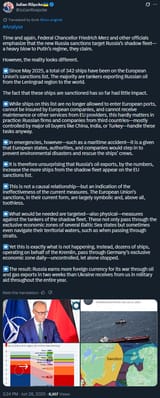Search Results
6/28/2025, 7:22:38 PM
>Time and again, Chancellor Friedrich Merz and other officials emphasize that the new RU sanctions target Russia’s shadow fleet—a heavy blow to Putin’s regime, they claim.
>However, the reality looks different.
>Since May 2025, a total of 342 ships have been on the EU’s sanctions list. The majority are tankers exporting RU oil from the Leningrad region to the world.
>The fact that these ships are sanctioned has so far had little impact.
>While ships on this list are no longer allowed to enter EUR ports, cannot be insured by EUR companies, and cannot receive maintenance or other services from EU providers, this hardly matters in practice: RU firms and companies from third countries—mostly controlled by major oil buyers like China, India, or Turkey—handle these tasks anyway.
>In emergencies, however—such as a maritime accident—it is a given that EUR states, authorities, and companies would step in to prevent environmental disasters and rescue the ships’ crews.
>It is therefore unsurprising that RU’s oil exports, by the numbers, increase the more ships from the shadow fleet appear on the EU sanctions list.
>This is not a causal relationship—but an indication of the ineffectiveness of the current measures. The EU’s sanctions, in their current form, are largely symbolic and, above all, toothless.
>What would be needed are targeted—also physical—measures against the tankers of the shadow fleet. These not only pass through the exclusive economic zones of several Baltic Sea states but sometimes even navigate their territorial waters, such as when passing through straits.
>Yet this is exactly what is not happening. Instead, dozens of ships, operating on behalf of the Kremlin, pass through GER's exclusive economic zone daily—uncontrolled, let alone stopped.
>The result: RU earns more foreign currency for its SMO through oil and gas exports in two weeks than the UA receives from us in military aid throughout the entire year.
>However, the reality looks different.
>Since May 2025, a total of 342 ships have been on the EU’s sanctions list. The majority are tankers exporting RU oil from the Leningrad region to the world.
>The fact that these ships are sanctioned has so far had little impact.
>While ships on this list are no longer allowed to enter EUR ports, cannot be insured by EUR companies, and cannot receive maintenance or other services from EU providers, this hardly matters in practice: RU firms and companies from third countries—mostly controlled by major oil buyers like China, India, or Turkey—handle these tasks anyway.
>In emergencies, however—such as a maritime accident—it is a given that EUR states, authorities, and companies would step in to prevent environmental disasters and rescue the ships’ crews.
>It is therefore unsurprising that RU’s oil exports, by the numbers, increase the more ships from the shadow fleet appear on the EU sanctions list.
>This is not a causal relationship—but an indication of the ineffectiveness of the current measures. The EU’s sanctions, in their current form, are largely symbolic and, above all, toothless.
>What would be needed are targeted—also physical—measures against the tankers of the shadow fleet. These not only pass through the exclusive economic zones of several Baltic Sea states but sometimes even navigate their territorial waters, such as when passing through straits.
>Yet this is exactly what is not happening. Instead, dozens of ships, operating on behalf of the Kremlin, pass through GER's exclusive economic zone daily—uncontrolled, let alone stopped.
>The result: RU earns more foreign currency for its SMO through oil and gas exports in two weeks than the UA receives from us in military aid throughout the entire year.
Page 1
